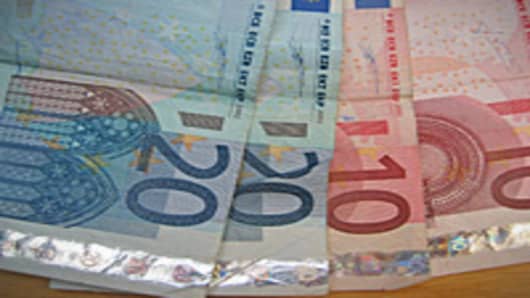Bank deposits at the European Central Bank have more than doubled to a five-month high and European institutions are paying more for dollars, signs of concern that turmoil in eurozone bond markets could spread.
The ECB said that banks deposited 104.9 billion euro ($150 billion) overnight on Tuesday, the highest level since early February and up from 49.9 billion euro on Friday. The central bank pays below market rates, implying the jump means that banks are hoarding funds rather than lending to each other.
A number of short-term funding markets were unnerved last week by the US debt ceiling drama but analysts said the jump in deposits pointed to more than that.
"The moves we've seen in the past three days suggest this is nervousness based in the euro markets, not elsewhere," said Simon Smith, chief economist at FXPro.
In a further sign of dislocation in short-term funding markets, the rates European banks must pay for dollars have jumped.
A gauge that measures the spread, or difference, between the price of dollars in three month's time and the rates implied by equivalent US and eurozone interest rates has reached levels last seen in the aftermath of the first Greek bail-out last year, according to analysts at Morgan Stanley .
Banks were this week paying 63 basis points over three-month US interbank market rates, the bank said, up from about 30bp last month - though this is still far below the 200bp-plus peak reached following Lehman Brothers' 2008 collapse.
European banks often issue short-term US commercial paper to get dollar funds but this market has slowed as would-be lenders pulled back amid the negotiations over raising the US debt ceiling. This has forced banks instead to turn to the open currency markets, where the surge in demand has in turn led to a squeeze.
Bankers said it was difficult to gauge the significance of the market moves because of the thin holiday-like trading typical of August.
"The real pressure is going to come in September for many banks. We know they were ahead of the curve in their funding in June, but some could come under stress in the autumn if they're still not getting access," said one senior syndication banker.
Italian bank debt has come under particular pressure as yields on the country's sovereign bonds have reached euro-era highs.
"The wholesale market due to the spreads can't be tapped. On the short (term market) liquidity is there," said Marina Natale, chief financial officer of Unicredit, on Wednesday during a call to discuss the bank's results.
Most Spanish banks and savings banks have been struggling for months to raise money in the wholesale finance markets, and the latest jump in sovereign bond yields has made the prospects for the rest of the year grimmer, according to bankers and analysts in Madrid.
No Spanish private sector lender has sold bonds since a poorly-received €1bn covered bond from Santander, the eurozone's biggest bank by market capitalisation, just over two months ago, according to Analistas Financieros Internacionales, a research group.
Spanish banks have been relying heavily on repurchase transactions through clearing houses such as LCH.Clearnet, where they can raise short-term liquidity by posting government bonds as collateral.


